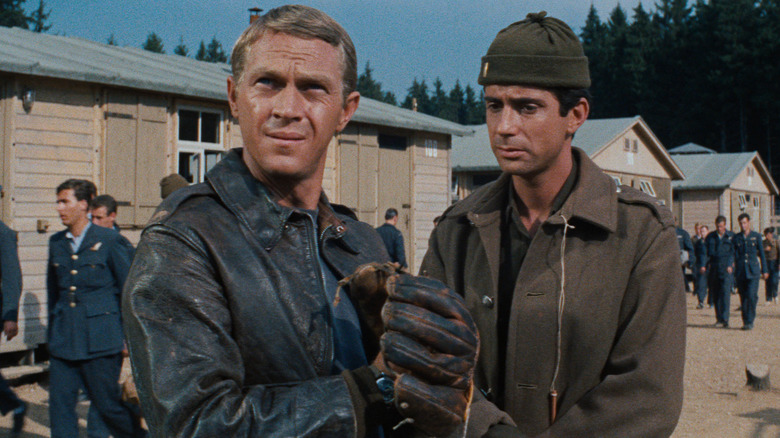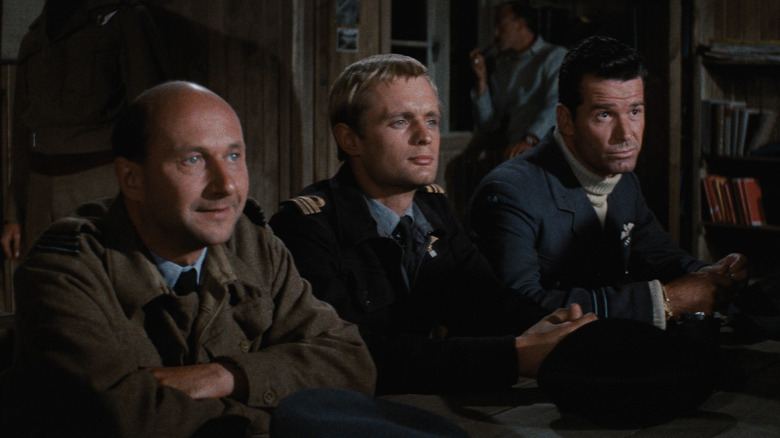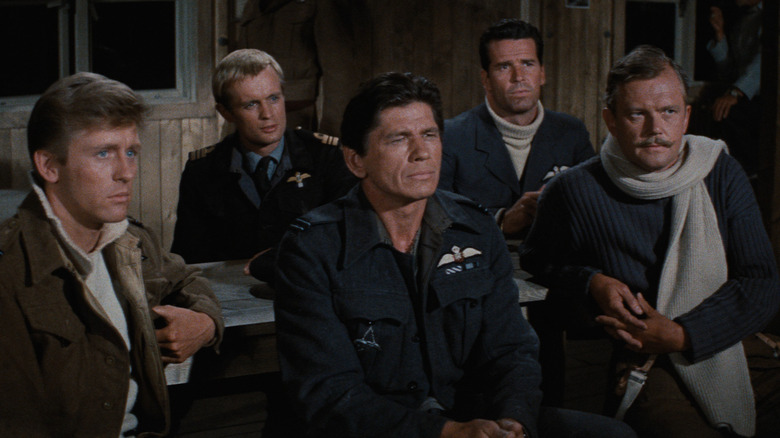The Great Escape Called In The Cavalry To Get Its Military History Right
Authenticity is important when it comes to any movie set in our reality, otherwise, some of the audience is going to lose their suspension of disbelief. By making a film as believable as possible, filmmakers help ensure that they keep the audience engaged. Authenticity can be hard to come by, but hiring cast and crew members who have experience with a movie's subject can lead to some truly impressive results.
The 1963 movie "The Great Escape," based on Australian fighter pilot Paul Bruckhill's non-fiction World War II book of the same name, had a cast and crew full of people with military experience. The movie isn't religiously faithful to its source text and follows a fictionalized version of events, but there were enough people with military histories around to provide details on the authentic military and POW experience and make the film as "real" as it could be. Some of the stars, including Donald Pleasence and Hannes Messemer, were survivors of POW camps, while several others had served in the war in some capacity. They also had consultants on hand to help with the details of the camps and tunneling to escape, allowing director John Sturges to focus on how to depict the story in the most compelling way.
A cast with some hard-earned experience
The team on "The Great Escape" included veterans from multiple countries and both sides of the war, which probably made for some pretty interesting on-set conversations. British actor Pleasance served in the Royal Air Force and had his plane shot down over occupied France, where he was taken into custody and placed in Stalag Luft 1, a German POW camp. On the other end, Messemer, who played the anti-Nazi German officer Colonel Von Luger, was a former German soldier who had been taken captive in Russia and was a POW in a Russian camp before escaping and walking hundreds of miles across frozen tundra to get back to his home nation.
The movie was shot in Germany, and Messemer was not the only former German soldier on set. Some had served as camp guards in German POW camps, while others were imprisoned in American POW camps overseas, but if there was any serious animosity between people who had been former enemies, there isn't a record of it. While having people who may have formerly faced one another on the battlefield work together on the same movie might seem like a bad move, "The Great Escape" is much more nuanced than many other war films of its time and is a story about human ingenuity and resilience that doesn't paint its characters as outright heroes or villains. It's smart filmmaking, and the input of people from opposing backgrounds likely added to its sharp commentary on not only World War II but all wars.
A true-ish story with the right ideas
An opening card at the beginning of the film gives a strange explanation of the film's dedication to detail to audiences, revealing that the particulars of certain characters aren't all that exact, but the movie is still accurate where it counts:
"This is a true story. Although the characters are composites of real men, and time and place have been compressed, every detail of the escape is the way it really happened."
The characters were changed to help appeal to audiences, with a focus on American characters, but the details of the escape itself and the POW experience were held sacred. On top of all of the POW camp survivors, U.S. Army Korean war veteran Garner worked as a "scrounger," just like his character. On the advisory front, the book's author, Brickhill, served as a technical consultant, along with C. Wallace "Wally" Floody, a former Canadian Royal Air Force pilot and engineer who had actually been a "tunneling king" in the real Stalag Luft III, the camp where the story takes place.
The real experiences behind the fictional version of a real POW camp escape helped shape it into one of the most revered war films of all time. People may remember it a bit more readily for Steve McQueen's motorcycle jump or famous tough guy Charles Bronson playing a totally different kind of role, but the contributions of some of its other stars (and crew) were the foundation of this celebrated classic.


